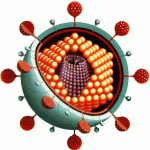Virology
|
28 april 2015 01:37:50 |
| Lessons learnt from the first controlled human malaria infection study conducted in Nairobi, Kenya (Malaria Journal) |
|
Tweet Background:
Controlled human malaria infection (CHMI) studies, in which healthy volunteers are infected with Plasmodium falciparum to assess the efficacy of novel malaria vaccines and drugs, have become a vital tool to accelerate vaccine and drug development. CHMI studies provide a cost-effective and expeditious way to circumvent the use of large-scale field efficacy studies to deselect intervention candidates. However, to date few modern CHMI studies have been performed in malaria-endemic countries.
Methods:
An open-label, randomized pilot CHMI study was conducted using aseptic, purified, cryopreserved, infectious P. falciparum sporozoites (SPZ) (Sanaria® PfSPZ Challenge) administered intramuscularly (IM) to healthy Kenyan adults (n = 28) with varying degrees of prior exposure to P. falciparum. The purpose of the study was to establish the PfSPZ Challenge CHMI model in a Kenyan setting with the aim of increasing the international capacity for efficacy testing of malaria vaccines and drugs, and allowing earlier assessment of efficacy in a population for which interventions are being developed. This was part of the EDCTP-funded capacity development of the CHMI platform in Africa.DiscussionThis paper discusses in detail lessons learnt from conducting the first CHMI study in Kenya. Issues pertinent to the African setting, including community sensitization, consent and recruitment are considered. Detailed reasoning regarding the study design (for example, dose and route of administration of PfSPZ Challenge, criteria for grouping volunteers according to prior exposure to malaria and duration of follow-up post CHMI) are given and changes other centres may want to consider for future studies are suggested.
Conclusions:
Performing CHMI studies in an African setting presents unique but surmountable challenges and offers great opportunity for acceleration of malaria vaccine and drug development. The reflections in this paper aim to aid other centres and partners intending to use the CHMI model in Africa. |
| 129 viewsCategory: Epidemiology, Virology |
 Plasmodium falciparum in the southeastern Atlantic forest: a challenge to the bromeliad-malaria paradigm? (Malaria Journal) Plasmodium falciparum in the southeastern Atlantic forest: a challenge to the bromeliad-malaria paradigm? (Malaria Journal)Paradoxical sleep deprivation impairs mouse survival after infection with malaria parasites (Malaria Journal) 
|
| blog comments powered by Disqus |
MyJournals.org
The latest issues of all your favorite science journals on one page
The latest issues of all your favorite science journals on one page



